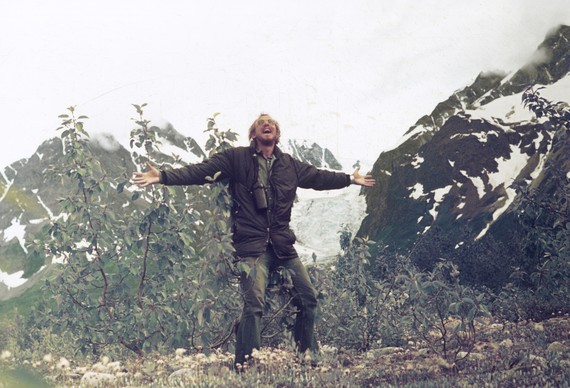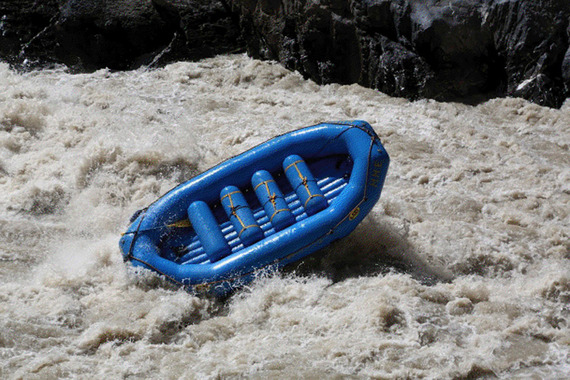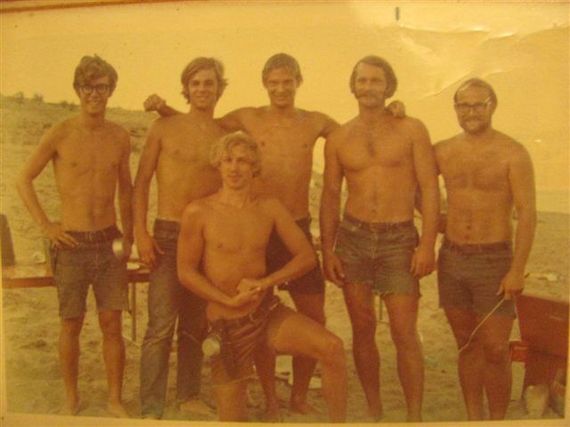Rob Hall was the ultimate guide.
He sacrificed his life helping his client realize a life-long dream, to stand atop the highest mountain in the world.
To refresh, Rob Hall was one of two competing lead guides taking clients up Mount Everest in May 1996. The other, Scott Fischer, had originally signed up Jon Krakauer, on assignment for Outside Magazine, but Rob Hall was able to woo the well-regarded writer to his expedition by offering a steeper discount.
Rob knew the value of a feature in Outside, especially one that celebrated a successful climb. It would be great for reputation, and business. And he knew the power of a good narrative.
The year before Rob had guided Doug Hansen, a postal worker from Renton, Washington, to within 300 feet of the summit. Doug couldn't afford the full fare to return, so Rob offered a significant discount, and put him as tent mate with Jon Krakauer. They bonded, as not unexpected, and the story would be so much richer if Jon's article played the arc of Doug Hansen's triumphal return, under Rob Hall's guidance.
But things didn't go as planned. On Summit Day, May 10, there were too many climbers on the mountain, creating a log-jam at the Hillary Step. Rob Hall had a strict turn-around rule of 2 p.m., meaning if a client did not summit by that time, he had to turn around, to insure getting to camp before darkness or bad weather.
But Doug Hansen didn't make that deadline. By 3 p.m. Doug was still not on top. Finally at 4 p.m. he made it, his long-time goal achieved. But the infamous storm blew in, and Doug didn't make it off the mountain.
Neither did Rob Hall, Scott Fischer, and five others.
So, Rob Hall was the ultimate guide.
Except he wasn't.
Rob Hall faltered in judgment, lost his reason, and allowed good decision-making to be swayed by outside factors. He put his own self-interest ahead of his client's, and they both paid the price.
Why am I one to critique Rob Hall's miscalculations? I wasn't on the mountain; I was in Redmond, Washington, a half-a-world away, following the unfolding events via the internet. So, how can I pass judgment?
Because I once did the same thing.
After having guided the Colorado River through the Grand Canyon for five seasons, I co-founded a company, Sobek Expeditions, which was pioneering raft trips in Africa. With a group of professional guides we had successfully made first descents of the Omo and Awash Rivers in Ethiopia, and set our sights on a river called the Baro that ran from Kaffa Province into the Sudan, where it conflued with the White Nile. But we were running low on finances, and when a man from New Jersey, Angus MacLeod, offered to pay to join our exploratory, I struggled with the proposition. He was a professional soccer player, and at 26 years old, in terrific shape... but he had never rafted a major river. He said he was looking for a transformational experience, and this seemed the ticket, and he offered enough money to practically pay for the whole of the expedition.
So, I decided to let money influence my decision, and said yes to Angus MacLeod.
When we arrived at the put-in, a bridge in a thick jungle gorge, we found the river in spate... it was overflowing its banks, and racing by at a terrible speed. But I was feeling trick, full of confidence, and decided we could handle it. I organized a scout of the first miles of the river, cutting through the rainforest and looking down at the torrent. But there was one stretch, perhaps 50 yards long, I couldn't see from the bank, as the river cut into an overhang. I guessed it wouldn't be so bad, as we could see up and downstream, and it looked passable.
But as soon as we launched I knew we were in trouble. I was in the first raft, and Angus was on my boat. I could barely control the raft as it swung into the unseen section... and over a waterfall. We immediately capsized. I came up next to the raft, and saw Angus trailing behind, the bowline wrapped around his chest. "Cut the rope," I yelled, as we all had knives attached to our belts, but he looked at me frozen in panic and did nothing. I let go of the raft and swam back to Angus, took out my knife, and cut the rope away from Angus, and looked him in the eyes and howled, "Swim to Shore!"
Then I went back to grab the boat. But as I was about to reach it, we plunged over another waterfall, and I was sucked to the bottom of the river. I struggled for an age, and finally popped to the surface, out of breath. I made a desperate swim to shore, and grabbed some roots, and pulled myself half out of the water. I puked. Then I passed out.
When I came to I found other members of the expedition wandering the banks calling out "Angus." He was gone. We continued to search for a few days downstream, until we lost the last of our rafts to the raging, croc-filled river. We never found Angus MacLeod.
Angus's death sent me into a tailspin. Up to that point, I saw guiding as the finest expression of freedom and validation that existed. I had seen firsthand the transformational power of guided journeys. But with this drowning, I saw the dark side of guiding. How could anything be celebrated that snatched away lives so full of promise, charity, and happiness? What sort of Faustian bargain had I struck? I had spent five years guiding wild rivers around the country, and had amassed more than my share of thrills and spills. Now shame ran through me like a sword. The lifejacket in my closet hung like an accusation beside my winter coat. Suddenly the thought of guiding a river seemed evil, a frivolous exercise that had such an insidious downside that I couldn't imagine why people would risk it. I saw it all as a photographic negative of the way I had seen it before; everything white was black. The thought of laughing while paddling through the raised fist of a wave, a slap of whitewater that could knock a person unconscious and suck the life from a precious body, was abhorrent, pornographic, insane.
My attitude about guiding bent like a gooseneck. The wilderness was an acid bath. I hung up my paddle.
I was in such a sulfurous funk I was a monster to live with. I carved out my own little meat department of metaphysical angst, and it stunk. My girlfriend moved out; moved to Montana and not long after married a doctor. I never saw her again. I buried myself in studies, and tried to forget the pain. My life became bland and vapid, a world behind glass. But, as the months wore I began to soften. Guide friends would stop by my apartment on their way to run a river, and when I tried to explain my hostility for what they were doing, their eyes looked over my shoulder. And, at social functions, I couldn't ignore the palpable excitement across the room when talk finally steered to adventures upcoming. That spring my most exciting endeavor was watching the tomatoes grow.
Then my friend and fellow guide John Yost came by and beseeched me to join him and a few other guides on a two-day raft trip down the Chattooga River in North Carolina. John persisted, and I gave in.
And while paddling through the wild water I found myself buzzing with joy, laughing and drinking in the experience.
The trip ended in the listless waters behind the Tugalo Dam. For two miles we paddled through a landscape that evoked death: Debris littered the shore like skeletons. Stripped trees were bent over as though crying. It was here I saw the difference. The river upstream was a celebration of life, full of sparkle, energy and exhilaration, brimming with beauty, bursting with challenge and the promise of attainment, and an agent for renewal This is what drew me to guiding in the first place; this is what had called Angus.
He had made a sacrifice, the supreme sacrifice, but it was in search of life, not sitting in stagnant, polluted waters behind a dam or a desk. If only for a moment, he lived life to its fullest, rode along the keen edge between water and sky.
For half a year my spirit had been hijacked. Now, I was back. And I realized that Guiding matters.
Guiding matters because it allows the uninitiated to experience the world in a profound and meaningful way. Guides connect clients to cultures and environments otherwise inaccessible. This can make an enormous difference. Because we guided so many down the Tatshenshini River in British Columbia. in the 70s and 80s, we were able to stop an open-pit copper mine, and establish an international park. Because so many have been guided through the Galapagos and Costa Rica, the governments changed their policies from extraction economies to honoring and abetting tourism. The list is endless.
A good guide is many things, as we all know. A guide is a parent, a doctor, a psychiatrist, an entertainer, a mechanic, an interpreter, a storyteller. A guide is Aristotle, teaching morals, manners, theology, and hygiene. A guide is a person who seeing there are only four pieces of dutch oven pie for five people, promptly announces he never did care for pie.
I think guiding is the noblest task, because you can't do it at your convenience, or tailor it to suit your preferences. It is about helping someone else feel and experience what you have.
It is rich in so many ways, yet you have to be ready to give up quite a bit when you take on this task: your time, restful nights, hobbies, all the private little pleasures you might have counted as a right.
Guiding is a Sisyphean task. You finish sewing one seam shut, and another rips open.
Sometimes when you guide you can feel the map of your own bones beneath your hands. But you keep the compass straight.
The best guides always put clients' needs before their own, period. Clients are the center of the universe. Guides always understand. They are never tired. They never lose their temper. They never say, "Go set up your tent while I have a beer." Guides cannot just respond to client's needs, they must predict them--with the telepathic accuracy of a Jedi.
When exhaustion cloaks a trip, mustering energy and enthusiasm is the requisite. But here is where it gets tricky.
Because Enthusiasm is that temper of the mind in which the imagination has got the better of the judgment. The thing to do is to supply light, and not heat. Good guiding consists in knowing not what things exist, but what they mean; it is not memory, it is not data, but judgment. Good and bad luck are synonyms, in the great majority of instances, for good and bad judgment.
So, a guide is so many things. But most of all, a guide is a leader with good judgment.
And how do you get good judgment? This, then, is the Good Guide Paradox:
Just as Friedrich Nietzsche said, "that which doesn't kill you makes you stronger," guiding success is the result of good judgment, good judgment is the result of experience, and experience is often the result of bad judgment! In other words, you have to risk and fall down to get to that high place of judgment that is sound.
One last story:
My first professional guiding trip was on the Colorado River through the Grand Canyon. I was the junior officer, and the trip was chartered by a group called Sierra Club Singles. There were 100 singles on the trip, and we had ten rafts, each carrying 10 folks. We stopped for lunch at a broad beach, and spent a couple hours serving the crowd, and then digesting and relaxing in the sun.
Then we re-loaded, and headed down to camp, just below Badger Creek, the first major rapid of the trip. As we were setting up the kitchen the trip leader, Dave Bledsoe, discovered we had forgotten the paper plates. This was a disaster, as we were serving steaks....and for the rest of the trip we had all sorts of meals that required plates, from pancakes to omelets to pork chops and ribs. We discussed trying to wing it...using our Sierra Club cups, or finding flat stones, but all ideas seemed insufficient.
Then, I made a judgment call. I offered to hike out of the canyon, hitch back to Lee's Ferry, fetch the missing plates, and make it back down to camp. Dave Bledsoe was skeptical, but let me go, and up the labyrinthine side canyon I went. I got lost several times, pitching into dead-end box canyons, but kept trying, and finally made it to the plateau. There I saw the glint of a passing car, and made my way to the road.
At the edge of the pavement I stuck out my thumb, and cars would slow down and take a look, and then speed up, when they got a glimpse of me, covered in canyon dirt, wearing short cut-offs with a large knife hanging from my belt.
But finally a Navajo in his pickup took pity and gave me a ride. I got to the warehouse, fetched the plates, and asked my friend Fred Burke if he would drive me down to camp in his jet boat.
As we sped along we passed the lunch stop, once a broad beach, but the Glen Canyon dam upstream had done its daily release to satisfy the power needs of Las Vegas and L.A., and the river had risen covering virtually all the sand.
Then in the corner of my eye I caught movement. I looked back hard, and saw a man, back against the canyon wall, water lapping his feet on a small sand spit. He was waving his white underwear and screaming, which I could barely hear over the roar of the boat.
We turned around, and pulled up to the castaway. He was one of the Sierra Club Singles, who had taken a nap behind a rock during lunch, and nobody knew he was missing when we moved down to camp.
He was relieved to be rescued, and enjoyed the rest of the trip, even hooking up with another single.
At the end of the trip, at take-out, he gave me the biggest tip of my career. $50 in my palm, and this advice: "Count the Clients," which resonated in all its meanings, and I realize now it is a key component in what makes a guide good.



